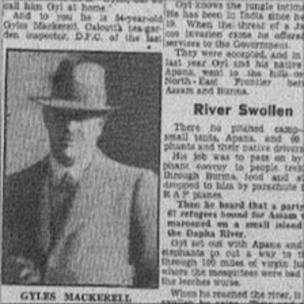Gyles Mackrell's own footage shows how elephants were used to rescue hundreds of refugees, stranded by flood waters in Burma in World War II
He was known as "The Elephant Man" in the newspapers of the time - but only now has the full story of one of World War II's most remarkable rescues come to light.
British tea planter Gyles Mackrell organised the evacuation of hundreds of people from Burma into British India in 1942 in the face of the Japanese advance in South Asia.
It's a remarkable story of courage, spirit and ingenuity that took place at a time when no one was sure what the consequences of the war in the Far East would beDr Annamaria Motrescu, Cambridge University Centre of South Asian Studies
There was only one way Mackrell could save those whose flight from the enemy was blocked by monsoon-swollen rivers at the border - by elephant.
Knowledge of his epic deeds has faded since, with Mackrell's modesty over events no doubt playing a part.
Now the tale is set to get a new lease of life after the donation to Cambridge University of a collection of letters, diaries and even amateur film footage documenting the extraordinary escapes.
Mackrell, aged 53 at the time, had spent most of his life in Assam - where he worked as an area supervisor for Steel Brothers tea exporters - when the call for help came.
The Burmese capital Rangoon had fallen and tens of thousands of people, many of them sick or wounded, made the trek across hundreds of miles and through dense jungle in search of the safety of the Indian border.
Starvation fear
By May 1942, groups of evacuees were stranded on the banks of the narrow rivers dividing the two countries, torrential monsoon rains making the waters almost impossible to cross. The RAF dropped food supplies but the British were able to do little more.
Mackrell, who had access to elephants through his work, was told about the situation on 4 June 1942 by a group who had managed to breach the Dapha River by forming a human chain while the water level was at a low.
 Image captionMackrell's exploits were reported at the time but became almost forgotten Image captionMackrell's exploits were reported at the time but became almost forgotten
Mackrell wrote in his diary, which makes up part of the collection: "I promised to collect some elephants and move off as quickly as I could as they told me the party behind would be starving, especially if they got held up by the rivers."
After initially rescuing a group of 86 soldiers trapped on a mid-river island, about 200 people had been saved by September that year.
At one stage Mackrell had to go back to Assam to recover from fever before returning to the Dapha.
The collection has been donated to the university's Centre of South Asian Studies by Mackrell's niece and an independent researcher, Denis Segal.
Archivist Dr Kevin Greenbank said: "The story is a sort of Far-Eastern Dunkirk, but it has largely been forgotten since the war.
"Without the help of Mackrell and others like him, hundreds of people fleeing the Japanese advance would quite simply never have made it."
Modest hero
The records include the testimony of some of those who were rescued, such as railway engineer John Rowland who describes how his group resorted to eating fern fronds to supplement the little food they had.
Wednesday, 10 June 1942
At 2am a different tune in the roar of the water brought me wide awake and I found the level falling. By 4am it was down to 3 to 4ft and was free of the logs and drift that had been such a terror to the elephants before...
The mahouts [elephant drivers] needed no urging. Rungdot, a Kampti elephant was the first to be ready and by 5.30 he was over...
By 7am he was back in camp with the first three refugees…
The others came in a few at a time and by midday we had the whole 68...
Within two hours of the last elephant and man to reach my camp, the snow water came down again and the whole island on which these men had been penned for 7 days was swept by a roaring torrent in which no human being could have survived.
Extracts from the diary of Gyles Mackrell
He wrote: "There is no nutriment in the additional diet.
"At all events it forms bulk and with luck it is hoped to spin out the rations for 24 days, after which, if no relief party or aeroplane arrives with rations, it is recognised that we must die of starvation."
A short note from Sir RE Knox, of the Treasury's Honours Committee in London, appears in the collection.
He concluded that the risk of death Mackrell faced "could be put, very roughly, at George Medal: 50 to 80%".
Mackrell did receive the George Medal and died in Suffolk in 1959.
Research associate Dr Annamaria Motrescu said: "Mackrell was embarrassed by the attention he received and even worried that people would think he had returned to the Dapha in the pursuit of a second medal.
"In fact, it's a remarkable story of courage, spirit and ingenuity that took place at a time when no one was sure what the consequences of the war in the Far East would be. It deserves to be remembered."
A short film about Mackrell's story is being released on the university's YouTube site, www.youtube.com/cambridgeuniversity. |